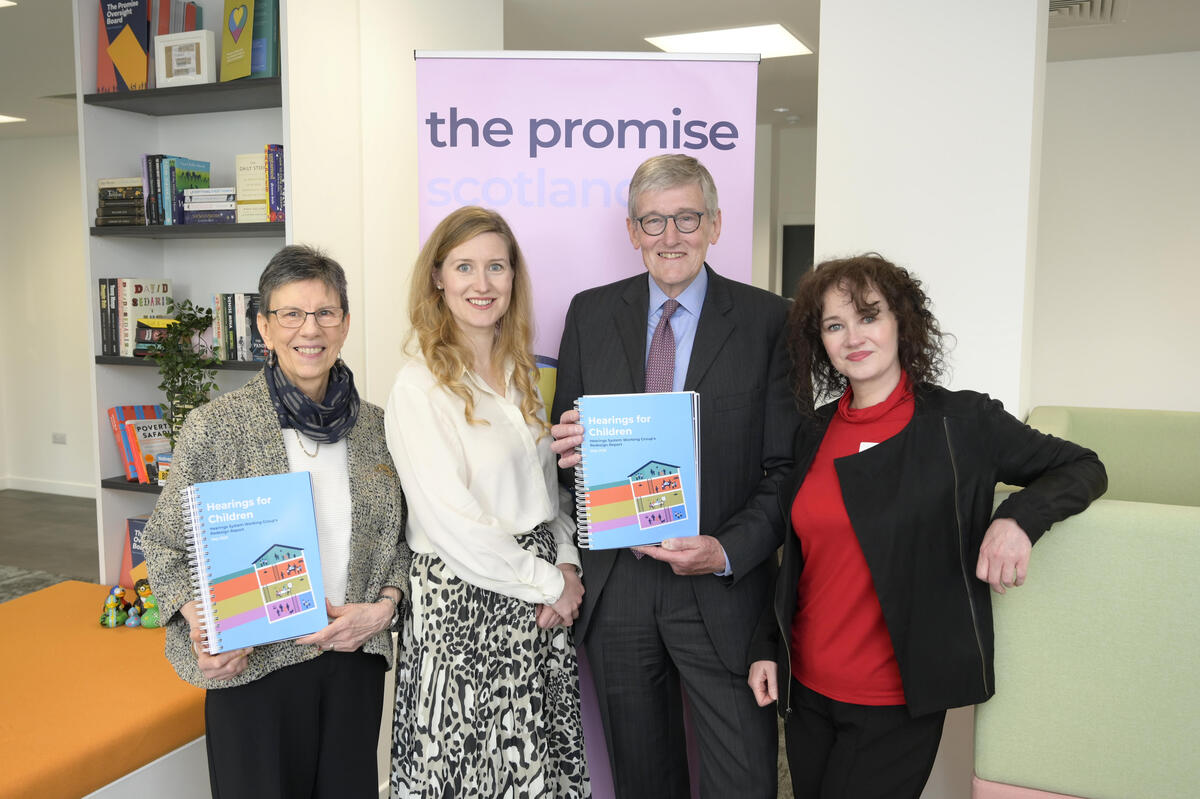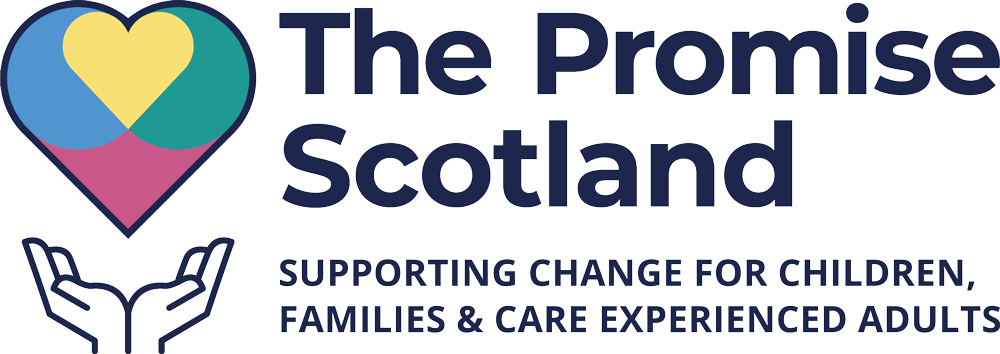Putting children at the centre: Redesign Report calls for radical new vision of Hearings System

From left to right: Michelle Miller, Chair of SCRA, Katharina Kasper, Chair of CHS, Sheriff David Mackie, Chair of Hearings System Working Group, and Fiona Duncan, Chair of The Promise Scotland.

From left to right: Fiona Duncan, Chair of The Promise Scotland, Fraser McKinlay, CEO of The Promise Scotland, Natalie Don MSP, Minister for Children, Young People and Keeping The Promise, and Sheriff David Mackie, Chair of Hearings System Working Group.
Historic reform to Scotland’s legal and welfare system was called for today - 25th May - with the publication of a new expert report on Scotland’s Children’s Hearings System.
The Hearings for Children redesign report was published by The Promise Scotland following the input of The Hearings System Working Group, a partnership group of:
- children with lived experience of the system, and
- experts.
And it calls for a new vision which “represents transformational change to the Children’s Hearings System.”
The report recommends changes to the makeup of a Panel
Currently, children in Scotland go to Hearings made up of volunteer Panel Members because:
- they are in need of care, protection and support, or
- they have come into conflict with the law.
The report recommends that a Hearing will consist of:
- a salaried and highly-qualified professional Chair, and
- two trained and skilled Panel Members, remunerated at a daily rate.
The changes, if implemented, will ensure that children have the same Chair every time they go to a Hearing.
Although the decision makers on the Panel will not need to be from any particular profession, this change - if accepted - will bring to a conclusion Scotland’s unique volunteers-only model.
The Independent Care Review’s Promise Report found that many children and families had difficult and challenging experiences when they had to retell their stories to different panel members— as this could involve repeatedly recounting traumatic experiences.
A less confrontational environment
The Promise Report found that children at Hearings didn't always feel:
- their past experiences were understood, or
- their voices were listened to.
The Redesign Report recommends that Chairs adopt an inquisitorial model for Hearings. This means they would have the power and responsibility to make sure discussions are not:
- overly adversarial or
- overly confrontational.
Other key recommendations in the Redesign Report
Asking for the views of children and families before a Hearing takes place
The Reporter must ask children and families their views when they are considering whether they need the legal support of the Children’s Hearing
Specialist training for decision makers
All decision-makers in the Children’s Hearings System will be given significant specialist training in:
- trauma,
- child development, and
- communication.
New processes and mechanisms around legal orders
To make sure legal orders happen in the way they are supposed to, there will be both:
- streamlined processes, and
- collaborative accountability mechanisms.
Children's Hearings should be linked into wider discussions
When other meetings and discussions happen, they should link to - and feed into - Children’s Hearings in a way which supports them.
A central role for the Child's Plan
The Child’s Plan – which plans for the care and support of a child or young person who may be in need of help or protection – should be seen as central to decision making in the Children’s Hearings System.
What was the Hearings System Working Group?
The Hearings System Working Group (HSWG) was created to oversee the redesign process for The Children’s Hearings System.
It was a partnership between:
- Children’s Hearings Scotland (CHS),
- The Scottish Children’s Reporter Administration (SCRA), and
- The Promise Scotland.
It was independently chaired by Sheriff David Mackie, and The Scottish Government were observers on the group.
Sheriff David Mackie said:
“Since its inception, in 1968, many children, families, care experienced adults and those working alongside them have shared their views and experiences about what has been working and what hasn’t within the Children’s Hearings System. Many have highlighted a system that often feels complex and confusing and which does not always make sense to children and families.
“The recommendations of the HSWG represent transformational change to the Children’s Hearings System and a modern update on the historic and revolutionary work of the Kilbrandon Committee. If implemented and resourced in full they will herald a step change not only for the Children’s Hearings System but for how we work alongside children and families across Scotland.”
Fiona McFarlane, Head of Public Affairs for The Promise Scotland, said:
“This group and report has been dealing with difficult, challenging and complex issues. CHS and SCRA must be thanked for the open way they have gone about this redesign process and their dedication to listening the voices of children and families.
“There will be challenges in making this vision delivered by this report a reality, but these recommendations align clearly with Scotland’s progressive direction on justice issues and ensuring there is early support for children and families to stop costly crisis interventions.
"Many individuals must be recognised for the contributions they have made to the Children’s Hearing System, but as we look to the future our priority must be a system that listens to and works for Scotland’s children.”
The report was informed by an extensive engagement and design process.
This included Over 500 hours of discussion and deliberation, including 12 sessions with young people and 11 sessions with parents and carers.
This process reflected the complicated and complex nature of the Children’s Hearings System, and resulted in detailed report with 14 chapters and 97 recommendations.
Ciara and Lisa of Our Hearings Our Voice, an independent board for children and young people from across Scotland between the ages of 8-18, who have experience of the Children’s Hearings System, commented:
“Being a part of redesigning the Children’s Hearings System has been truly rewarding and has given us a feeling like we’ve been listened to.
"We believe that these recommendations can deliver a system that delivers stability, support, continuity and accountability. This means establishing hearings that make children feel comfortable and listened to, and where the language used is easy to understand.
“This is the last time a group like this should be needed. Now, these recommendations need to be delivered so that we can have a system that speaks to children and not about them, and works with them and not around them.”
What happens next with these recommendations?
The recommendations of the new report will now be sent to the Scottish Government.
The Promise Scotland expects the Scottish Government will review the report and that the necessary legislative change will be enacted in the forthcoming Promise Bill,to be introduced in this Parliamentary Session.
